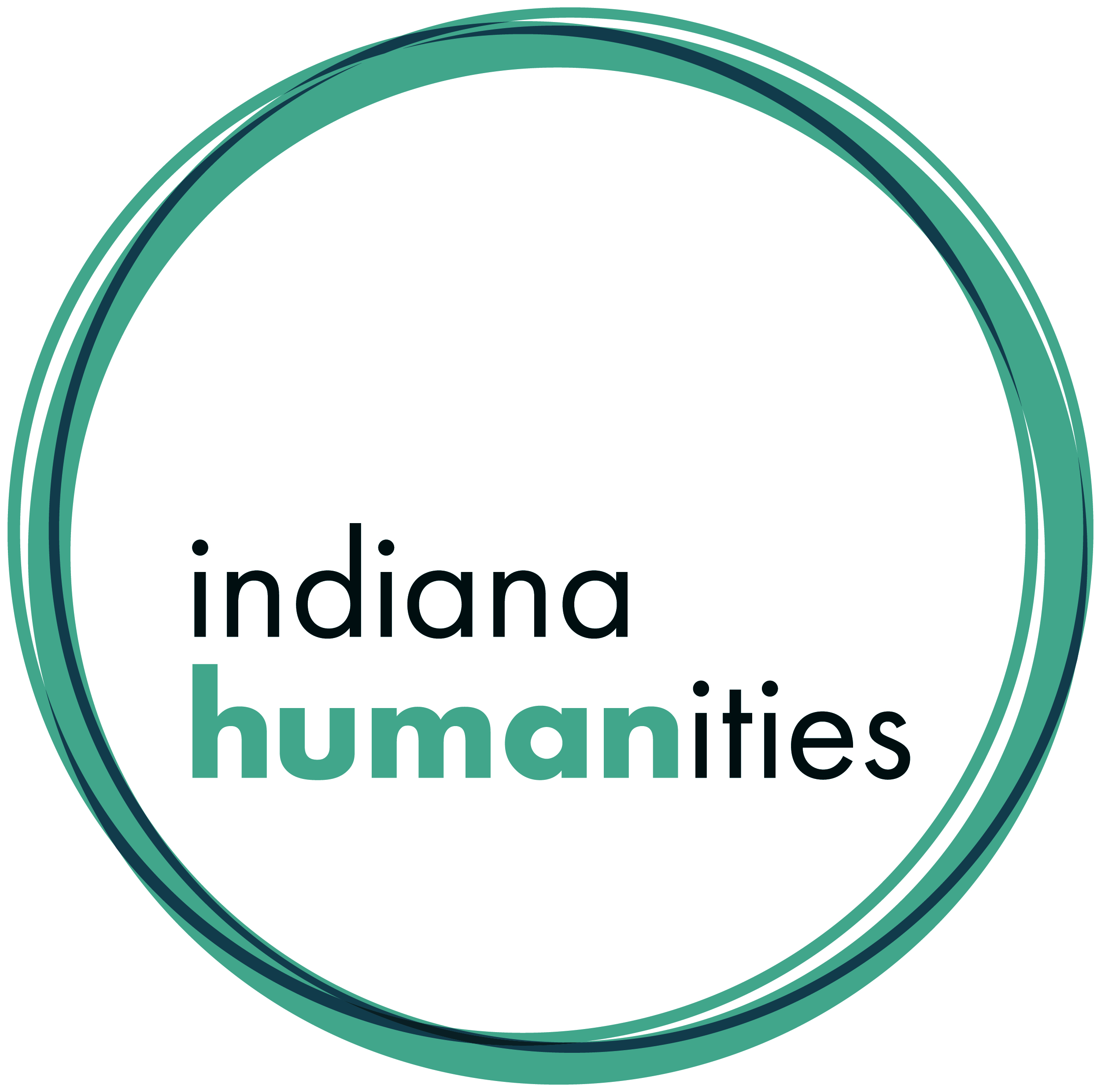Indiana Humanities is a statewide nonprofit that infuses the humanities into our daily lives. We do this by providing grants, convening discussions, uplifting humanities scholars, spotlighting humanities organizations and activities, and creating our own programs that help Hoosiers think, read, and talk.
Indiana Humanities creates unique opportunities to think, read, and talk.
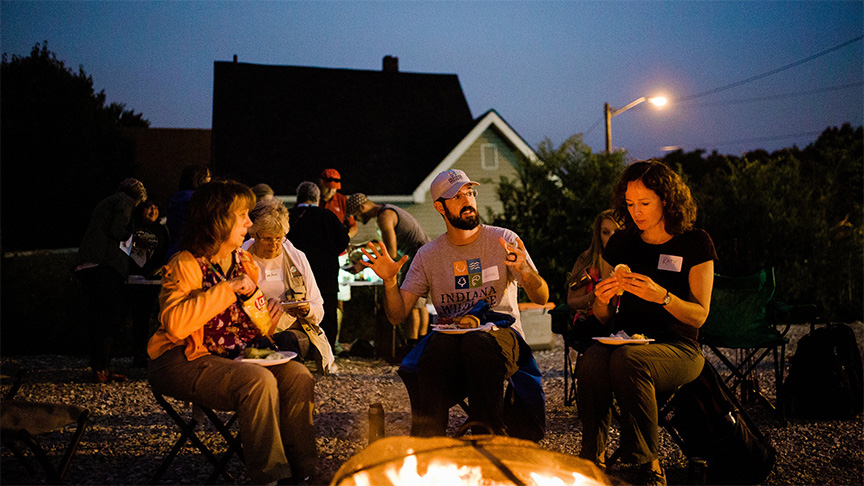
Photo courtesy of Indiana Humanities
One of the most profound things in this world is humanity—our creativity, our curiosity, and our undeniable need for community. We seek connection, and through that connection, we share the ideas and stories that make us feel human.
One evening, you might relax by the campfire while chatting about nature poetry. Maybe you’ll spend an afternoon at a local restaurant, having a meaningful conversation about challenging questions. Or perhaps you’ll sip a handcrafted cider while geeking out over a sci-fi series with like-minded locals.
You can do any of these things and more when you hang out with the folks at Indiana Humanities! Indiana Humanities is a statewide nonprofit dedicated to connecting people and enriching lives through the humanities.
With events like these, we tackle a serious mission—to create and fund public programs that make the humanities tangible and engaging. Indiana Humanities is nationally recognized for its creative approaches and unique events, but we work with one simple purpose: to encourage Hoosiers to think, read, and talk.
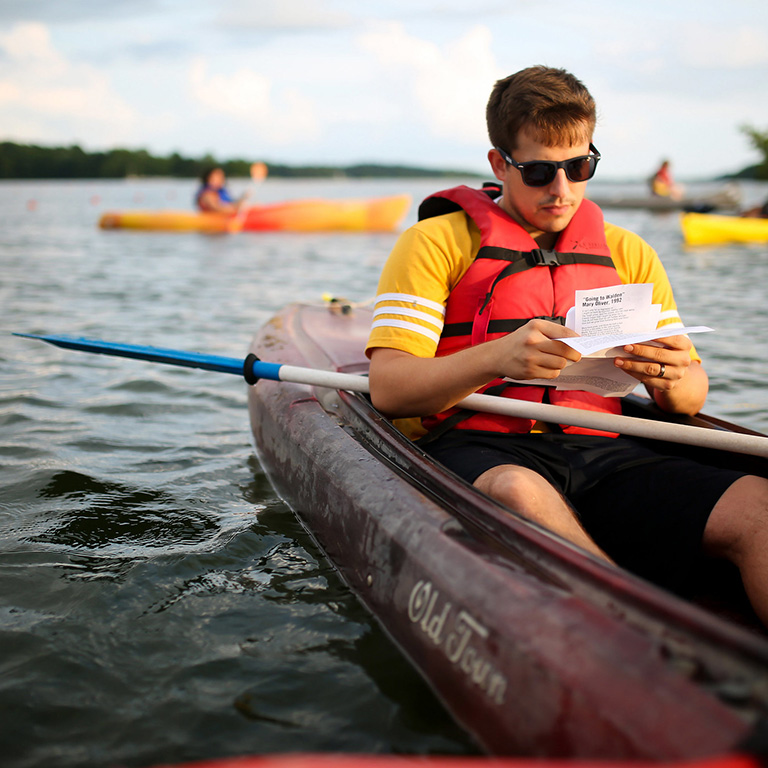
Photo courtesy of Indiana Humanities
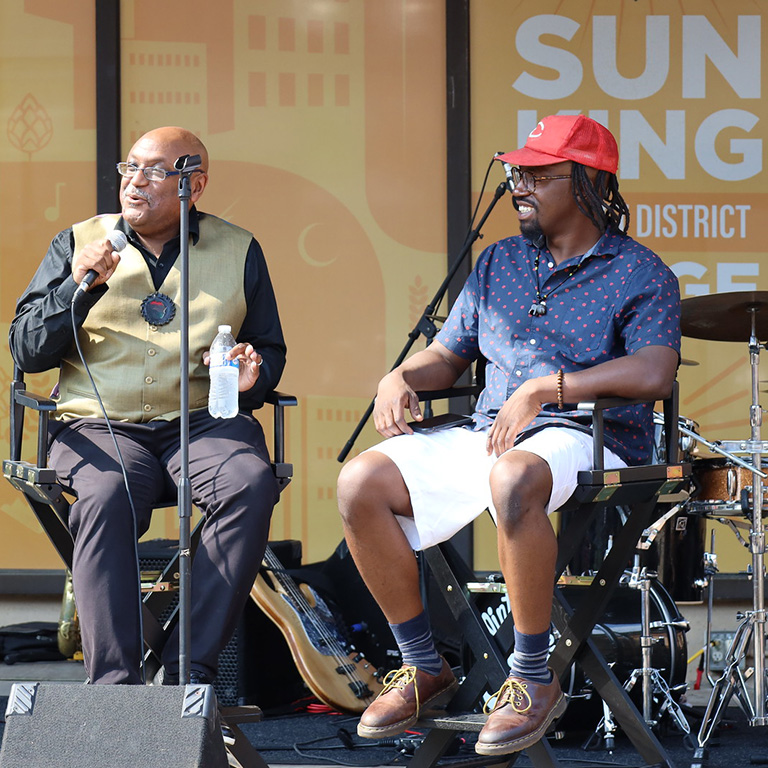
Photo courtesy of Indiana Humanities
We help define—and redefine—the humanities.
When people hear the word “humanities,” they typically associate it with academia, the arts, and related fields of study. However, the humanities are actually an important part of our everyday lives.
“The term ‘humanities’ refers to a set of disciplines including history, literature, philosophy, ethics, languages, world cultures, and religious studies,” said Keira Amstutz, Indiana Humanities President and CEO. “And if you look closely at that list, what you really see are tools humans use to understand who we are and how we relate to one another.”
With this definition as a guiding principle, we develop programs to engage communities on a wide range of topics, including climate change, the urban-rural divide, citizenship, and more.
Some of these programs include speakers bureau presentations, conversations with renowned authors, and traveling exhibitions to local libraries and museums. These traditional approaches are an important way to engage the community, but we also offer opportunities to experience the humanities through unique, innovative events!
At Indiana Humanities, you can go on an urban kayak trip with breaks to read nature essays. You can discuss the relationship between memory and nature, while biking along a former railbed. Or you can take a woodland hike with a naturalist and a poet before wrapping up with a beer by the campfire.
These are all examples from our award-winning Campfires program, which attracts crowds of people interested in learning new things and meeting new friends while lapping up nature, literature, cold beer, and friendly conversations!
Although it’s just one of our many programs, Campfires embodies what makes Indiana Humanities work. When our team decides on a topic, we dig deep to identify resources and imagine creative ways to present that information—all to help Hoosiers explore the humanities in the context of contemporary life.
Indiana Humanities creates meaningful experiences around powerful themes.
As varied as this programming might sound, Indiana Humanities doesn’t randomly choose activities. Every few years, we identify a new multi-year theme, and our team designs creative ways to engage Hoosiers on the topic.
For our current theme “Unearthed,” Indiana Humanities is encouraging Hoosiers to think, read, and talk about their relationship with the natural world.
Our statewide programming helps Indiana residents consider how we shape the environment on a global scale—and how the environment shapes us in turn. We also offer traveling exhibits and supportive grants that empower local organizations to examine their surroundings and consider how their communities interact with nature.
A key aspect of this thematic initiative has been the Waterways Film Tour, which made original short films to highlight our relationships with specific Indiana waterways. These films were funded by Indiana Humanities and made by local Hoosier filmmakers across the state! On top of that, several rural Indiana communities were selected to host Water/Ways, an interactive traveling exhibit created by the Smithsonian.
These themes encourage Hoosiers to dig deeper into our relationship with the world around us, reflecting on our humanity while inspiring us to create. In the past, Indiana Humanities has used similar strategies and programs to consider other themes.
“Chew on This” examined how humans relate to food. “Spirit of Competition” focused on what we learn and express by competing, while “Inseparable” discussed the issues that divide and unite us. And “Next Indiana” celebrated the state’s bicentennial by imagining what Indiana might look like in the coming years.
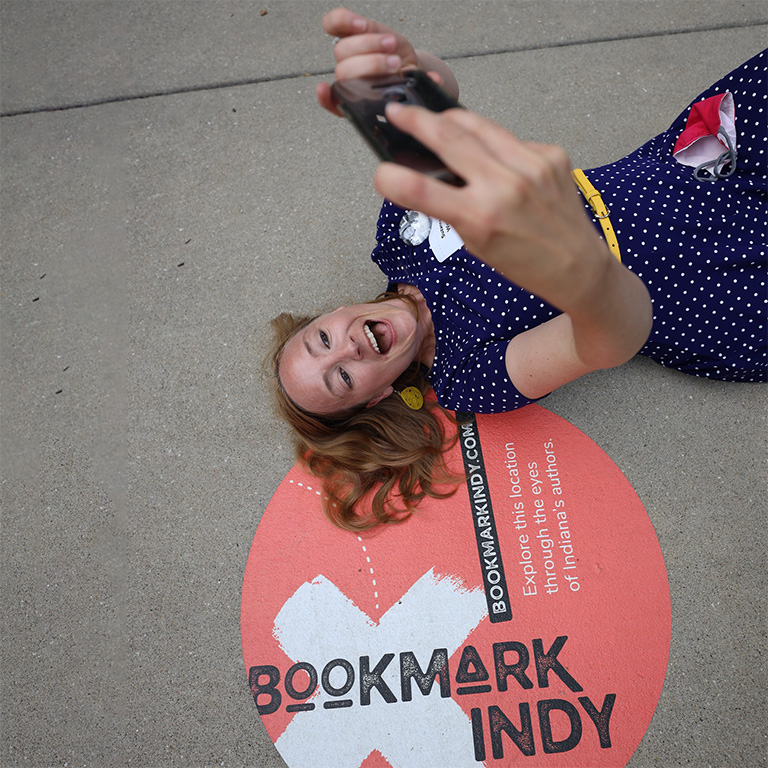
Photo courtesy of Indiana Humanities
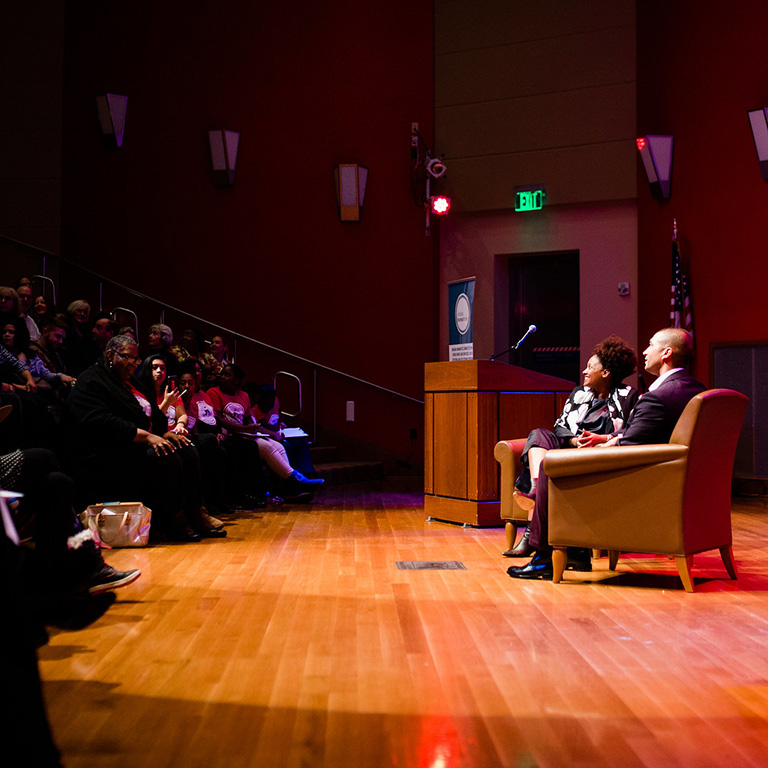
Photo courtesy of Indiana Humanities
Our programming supports community events that engage and educate.
At the same time, Indiana Humanities also addresses timely topics that fall outside our usual themes.
For example, in 2020, we helped Hoosiers celebrate the 100th anniversary of the 19th Amendment, which granted women the right to vote. Indiana Humanities honored the centennial by hosting conversations and events on the topic, as well as underwriting fellowships and grants to support scholarship around the suffrage movement.
Indiana Humanities also hosted “Frankenfest” to mark the 200th anniversary of Mary Shelley’s Frankenstein. This festival was a noon-to-midnight event that drew nearly 600 people to the Indiana Medical History Museum—the nation’s oldest surviving pathology lab! Guests participated in activities like the “Franken Yard Games” and enjoyed a night out at the Franks-N-Steins beer garden.
The point? To have fun, of course! But events like these also urge Hoosiers to reflect on important questions and related issues. At Frankenfest, we considered questions raised by the book, including: Are there limits to what we should do scientifically? And does the fact that we can do something mean that we should?
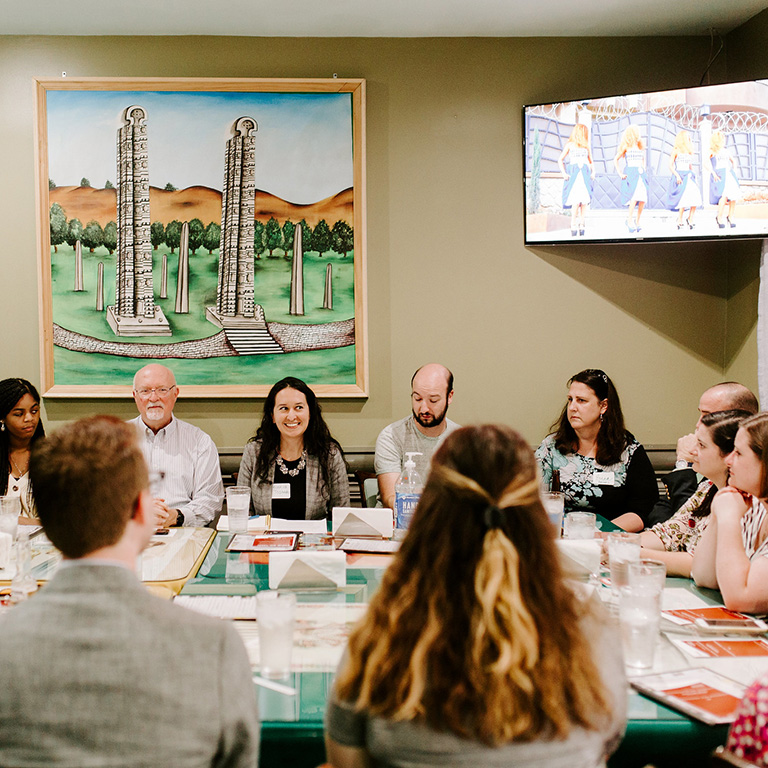
Photo courtesy of Indiana Humanities
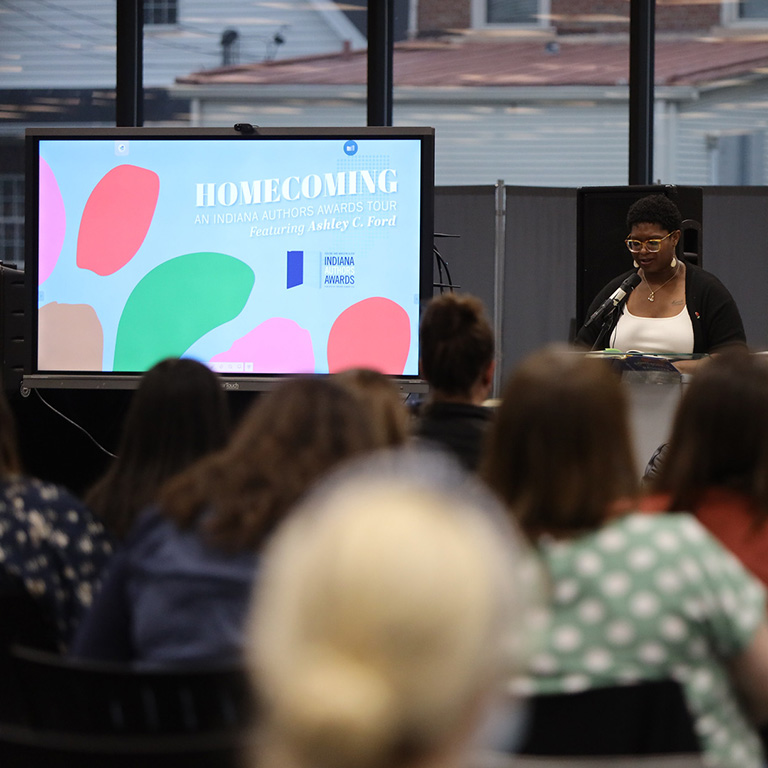
Photo courtesy of Indiana Humanities
We support local authors and create lifelong readers.
Because literature is a core humanities subject—and a popular one, Indiana Humanities prioritizes the written word, helping Hoosiers engage with books and other materials.
Nowhere is this more evident than the Eugene and Marilyn Glick Indiana Authors Awards. The Indiana Authors Awards are a celebration of Hoosier literature, honoring the contributions that Indiana authors have made to the literary landscape.
“Indiana has a rich literary tradition, and the Indiana Authors Awards allow us to show the world that the tradition continues,” said Amstutz. “Hoosier writers work in every genre—from inspirational poetry to world-shaping sci-fi, insightful YA fiction to thought-provoking nonfiction—and we need to make sure the world is aware of Indiana authors’ work.”
Indiana Humanities also recently launched Bookmark Indy—a self-guided tour of Indianapolis that features points of inspiration for famous Indiana authors, such as John Green, Kurt Vonnegut, Mari Evans, Dan Wakefield, and Booth Tarkington.
Using the website as your guide, you can find locations around town where these writers lived, worked, and drew inspiration for their books. These “bookmarks” provide information about each site, as well as questions to prompt your own creativity and exploration.
The result? Bookmark Indy is a fun way to explore the city, discover locations from famous novels, and tap into Indy’s rich literary culture. Along the way, you’ll also get to enjoy beautiful local art, and you might even find inspiration to make your own mark on history!
We also offer a variety of programs that encourage Hoosiers to read and discuss literature. One State/One Story invites all Hoosiers to participate in a statewide read, while Novel Conversations sends books to reading groups across Indiana—free of charge. And you’re always welcome at Books, Booze and Brains, our monthly book club for the scientifically curious!
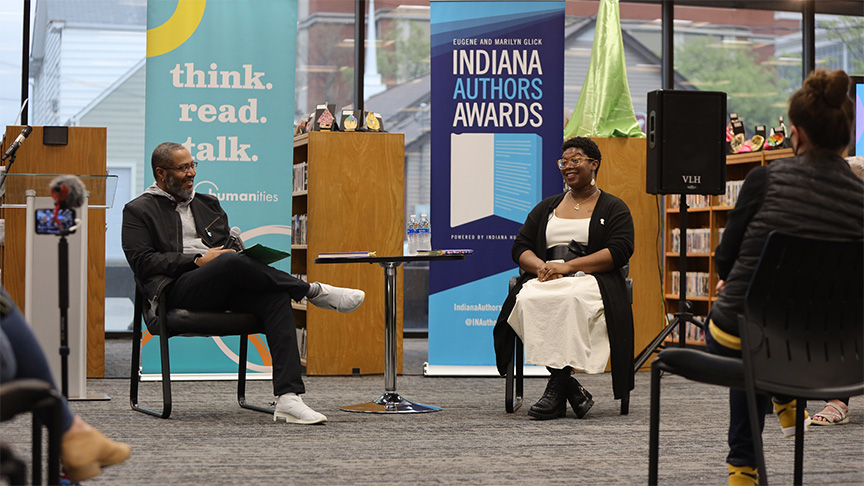
Photo courtesy of Indiana Humanities
The humanities connect people, open minds, and enrich lives.
From philosophical questions to cultural studies, the humanities help us connect with the world—and the people—around us. They help us understand one another, as we learn more about ourselves. Because the “humanities” are more than just academic disciplines. The humanities are a process—a journey to pursue truths about the shared human condition.
At Indiana Humanities, we believe that anyone can participate in the humanities. That’s why we purposefully design events and activities that appeal to diverse groups of people. Whether you’re hiking through a nature preserve, watching a local film screening, or hitting a brewery to talk about science fiction, Indiana Humanities has something for everyone.
These events are also a great way to learn about Indiana and our Hoosier community. Our programs are designed not only to inform you about an issue, person, or location—but also to personally and actively engage you in discovery. As a result, both new residents and lifelong Hoosiers can learn new things while making lasting memories.
“The humanities constantly open doors to new perspectives and new experiences,” said Amstutz. “And if we do it right, they open the door to a lot of fun, too!”
To learn more, visit IndianaHumanities.org.


